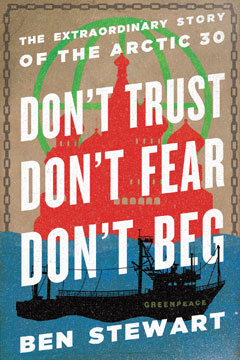The rapidly melting Arctic should not be seen as an invitation to drill for oil, says Greenpeace, the protagonist of this gripping and timely book. Between extreme conditions and low safety standards, an Arctic oil spill is an epic ecological disaster just waiting to happen. A paucity of roads, ports and runways, not to mention local expertise, renders the idea of a timely response nothing more than a comforting myth. Plus we still don’t fully understand how oil breaks down in the cold, or how chemical dispersants could work in such temperatures. We do know, however, that both can be highly toxic to marine organisms, and that the Arctic’s environment is extremely sensitive. And we do know that the Arctic plays a critical role in regulating the planet’s climate. As author Ben Stewart puts it, “What happens in the Arctic doesn’t stay in the Arctic. It’s the planet’s air conditioner.”
We also know that oil companies are seizing the opportunity presented by the quickly-melting Arctic by scrambling to pump oil from its seabed. As of this writing, Shell is days away from drilling off Alaska. Shell also has plans to drill in the Russian Arctic, where environmental safeguards are dubious at best, through its joint venture with Gazprom, the state-owned energy giant. It’s a vicious and grimly ironic circle: The more fossil fuels we burn, the faster the Arctic melts, making it easier to access and burn even more fossil fuels.
In September of 2013, a Greenpeace vessel travelled to the international waters of the Pechora Sea, off western Siberia, to protest against Gazprom. On board the Arctic Sunrise were 30 men and women from 18 countries, including Canada. Their goal was to peacefully occupy Gazprom’s oil platform, the Prirazlomnaya, which was poised to be the first Arctic offshore oil platform to go into production.
But the Greenpeace plan went awry and instead the Arctic Sunrise was boarded by 20 masked, heavily-armed Russian commandoes and towed to Murmansk. There, a show trial resulted in the protesters being charged with piracy and thrown in jail with sentences of up to 15 years. Don’t Trust, Don’t Fear, Don’t Beg is the engrossing account of their months of captivity in Russia’s notorious prisons, the Kremlin-directed efforts to thwart their release, and the huge Greenpeace push to “Free the Arctic 30.”
Integral to this push was a massive global media campaign. As the person who led it, Stewart was both observer and participant in the drama. He brings this intimate knowledge to the story, bolstered by hours of interviews with the protestors, along with excerpts from their prison diaries. The result is an engaging narrative that by turns reads like a political thriller, a fascinating immersion in Russia’s prison culture, and a sobering primer on the centrality of Arctic oil to Putin’s rule. (“The Arctic is Russian Mecca,” recently declared the official in charge of the country’s policy on the area.) So compelling is the story of the Arctic 30 that Oscar-winning producer David Puttnam has come out of retirement to bring it to the big screen, with Emma Thompson rumoured to be writing the screenplay.
Key to Stewart’s success is his decision to focus on just a handful of the protesters, all of whom know how to tell a cracking story. So we live the nervy attempt by Finland’s Sini Saarela as she climbs the massive Prirazlomnaya, only to get pummeled with freezing Arctic water by the platform workers. We share the amazement of Frank Heweston, the British coordinator of the protest, when his Russian cellmates initiate him into the prison’s illegal system of communication, “the road,” which relies upon an elaborate network of strings running along the outside walls.
But it is Dima Litvinov, the Russian-born, US-raised lead campaigner, whose perspective is the most revealing. As the fourth generation of his family to be jailed for challenging the Russian/Soviet state, he is keenly attuned to abuses of power. And these antennae are on full display in his bizarre showdown with the prison’s hardline governor, a man who waxes nostalgic for the Gestapo. It is Dima’s cellmate, quoting the prison maxim on how to deal with authority, who provides Stewart with the book’s title.
“Don’t Trust, Don’t Fear, Don’t Beg” takes on an added resonance in Greenpeace’s behind-the-scenes attempts to get the Arctic 30 released. In a secret meeting with an influential figure in Russia’s opposition movement, the team is warned that Putin doesn’t respect any hint of weakness and so they must never resort to begging. What Putin does respect, especially just months away from the Sochi Olympics when Russia is under increased global scrutiny, is the opportunity to save face. So the campaign is at pains to never criticize him directly, only Gazprom.
After many dramatic turns, this strategy eventually pays off. Some three months after they were first arrested, the Arctic Sunrise crew is released when Putin steps in to amend an amnesty bill that also granted freedom to thousands of others, notably Pussy Riot.
The Arctic has been called “Ground Zero” for climate change. If we don’t get it right here, it doesn’t matter how right we get it elsewhere. As Paul McCartney writes in his moving introduction, while the episode of the Arctic 30’s incarceration may be over, the bigger story is only beginning. And “we still don’t know how it ends. That is up to all of us. Including you.”
Don’t Trust, Don’t Fear, Don’t Beg: The Extraordinary Story of the Arctic Thirty by Ben Stewart, New York: The New Press, 358 pages. Reviewed by Kelley Tish Baker.
Read our interview with author Ben Stewart about the role civil society and popular culture can play in effecting environmental change.
Reviewer Information
Kelley Tish Baker is a freelance writer and editor living in Ottawa.













